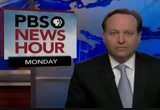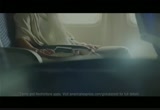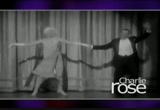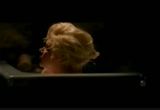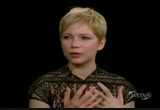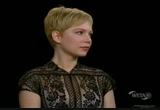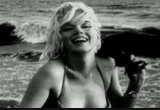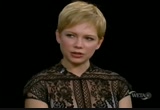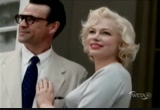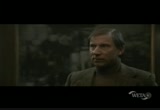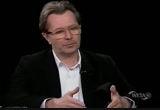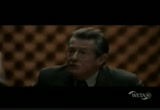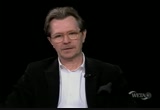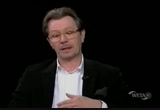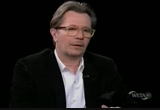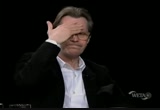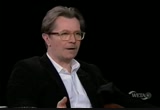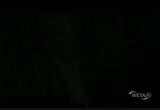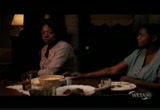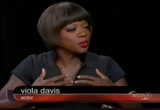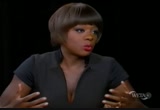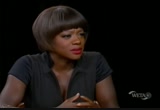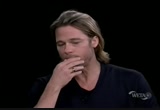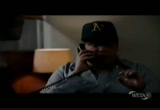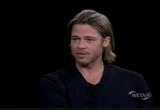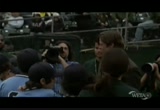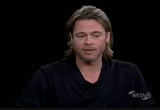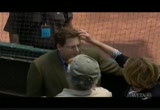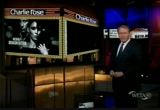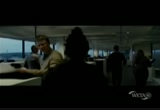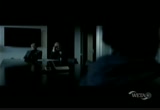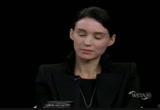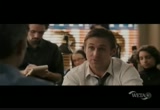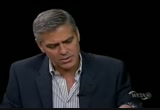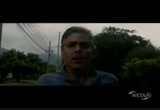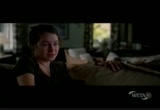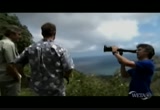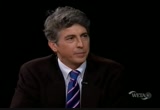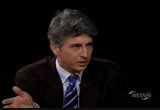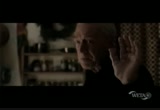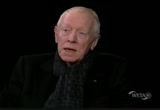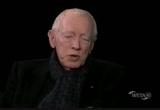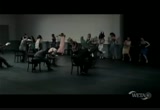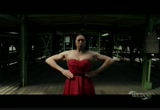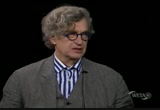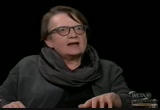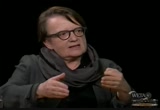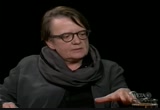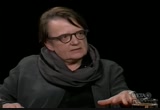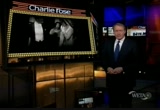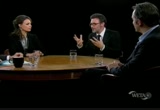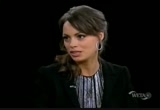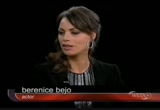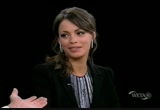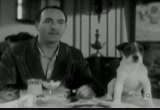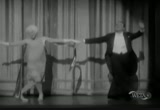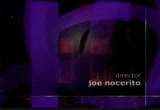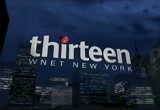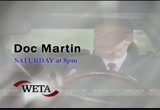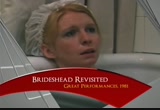tv Charlie Rose PBS February 25, 2012 12:00am-1:00am EST
12:00 am
12:02 am
from our studios in new york city, this is charlie rose. >> rose: its 84th annual ago add me award license held in hollywood on sunday night february 26th. we bring tonight many nominees that have come to our table, this year's selection explore themes that remind us why we love movies. they are about us and our culture. they reflect our past and protect and project our future. they're stories about places and moments that we want to return to, and never forget. from an ode to silent fill tomorrow tributes to animals whose lives were ago sacrificed in times of wars, movies that almost didn't get made, gripping portrayals from real life and captivating characters from literature. from high-tech to golden silences. here is our collection beginning with "my week with marilyn", two eye cons of entertainment, marilyn monroe an sir laurence olivier, their lives intersected the theatres and movies, drama and comedy, shakespeare and sensuality.
12:03 am
michelle williams nominated for best actress continues to immerse herself in her work. kennest branagh nominated for best supporting actor also a director of shakespeare's dramas. here they are in conversation on what it meant to take on two giants. ♪ ♪ that's the way to start ♪ nothing to lose ♪. >> my decision-making process has always been, it's just between me and the piece of material. and it's sort of this awful feeling when you realize that you are going to say yes and are you going to do something. because it means that it's sort of bigger than you. it means it sort of mystifies you and challenges you in some kind of new and terrifying way. which is why you have to go do it. and so i knew that the answer was yes. and then i sort of spent a little bit of time trying to figure out if i could back out of it. or change my plan or
12:04 am
something. >> rose: but there's so much about her in terms of all the multiple parts of her, shy and vulnerable, to the biggest movie star. >> that was the thing that i think drove me mad and kept me up at night shooting, am i getting all of it. so many dynamics at play. and i think it's what makes interesting characters and interesting people, are opposites. and she had so many of them. she just had multitudes. and i would pull my hair out how many of them am i capturing. how many of them. because also your research is endless when you play a part like this. the material available on her was constantly taking in new information, reading new books, watching new movies. stumbling across some new documentaries so constantly taking in new information, meaning i had to fold that into my interpretation so, it was just, that was the question. how much, how much of her am i able to contain at one time. >> rose: so here you are playing somebody that you have even been compared to. initially it seemed as though maybe that wasn't smartest thing to do. and that perhaps a bit like you know monroe, that there
12:05 am
is lots and lots to find out about, and lots to absorb and you have lots of materials. but there are lots of ways to get it wrong. and the notion of whether this sort of blurred notion of do you do an impression or impersonation, what is the way in which you capture the essence of something that's already being seen through this sort of fairy tale lens of a young man seeing it in a way rather innocently. so he paints them perhaps not in an absolutely naturallistic way. but all of that, of course, actually just becomes something very exciting to do. >> he was going through a kind of midlife crisis and he lacked to marilyn to rescue him and in a strange way she might well have done, but not on this movie. and the resultant tension is what in the end became just so irresistable to play in addition to what michelle was playing about just the treasure trove of material that, as an actor, makes you nervous, and really, really makes you excited. >> please, please, tell me how i can help you.
12:06 am
i mean he wanted her magic. and she wanted his what? >> approval. and also i would imagine input, direction but not in the way that it was being offered. >> rose: as an actress, as an entertainer, what was her magic? >> oddly enough she said that she really didn't like sing and dancing. she said that she wasn't trained. she didn't feel like she was very good at it. and to me, it's when she's at her most incandescent. more than anything she wanted to be great. she wanted to be a serious actress. as a performer, she didn't know what her gifts were or where they were. and i think she felt always insecure, never really a great sense of accomplishment ♪ ♪ by letting my ♪ ♪. >> rose: and then there's the question, how do you get that wiggle. >> i just sort of watching her movies over and over and over again and trying to basically, she does it so well it seems like t seems
12:07 am
like it's natural t seems like oh, maybe that is how she really walks and really speaks because it's so seamless. but then things start to sort of become clear. and you realize, you know, she was really quit, from all my research she was really quite average, i hate to say it. but with a normal voice and an ode walk. and it was a part that she played. marilyn monroe was a part that she honed and developed. and is so things became clear about the wiggle that maybe there was something that always seems to kind of bind her knees a little bit. and there's a kind of figure eight to her wiggle, i used to call it, it looks like she is sort of moving in a vat of-ee somehow. there is, there is a rhythm to it, an up temp po, and down tempo, an undualation to it. a sense of, she is sort of wa, did somebody say to me, hate to see you leave but love to watch you go. it takes a tremendous amount of energy to be somebody who is slightly different than yourself. and i discovered what she
12:08 am
was, to transmit that kind of energy openness, availability, to be what everybody wants you to be isn't human. it's a kind of superpower. and it takes a lot of energy to source that. and to put it out into the world. and some days, you know, she says herself, you know, what's it like to be an icon. she says on the days when you feel lonely, tired and unlovable, it is very difficult. it's a reason to not get out of bedment because it's so hard to exist for other people. >> rose: this year's contenders also include films based on bookses. tinker tailor, soldier spies based on the classic spy novel. one of the finest actors of our time gary oldman does a remarkable performance at george smiley, his first oscar nomination in 33 years of acting. >> i'm retired, oliver, you fired me. >> the thing is, some time
12:09 am
ago before controlled he came to me with a similar situation. that there is a -- >> he never mentioned his suspensions to you? >> no. >> oh, i just thought it was just you were his man, so to speak. >> what did you say to him? >> well, i'm afraid i thought his paranoia got the better of him and he was going to put his whole house down. that bloody mess in budapest. >> well, i was out of work but i think actors refer to it as resting. i was resting between engagements. and the phone rang and they said would you like to play george smiley in tinker tailor soldier spy. >> rose: and you said. >> i obviously knew the teeferment i knew the book. i had seen the original series in 679-- '79. and it gave me pause for
12:10 am
thought. they're enormous shoes to step into. with smiley, you can't futs too much-- fuss too much and mess with the molecules. there's a dna at work here. and you, i am, i think, inevitably going to arrive at the same destinations, not all of them, but the same, the same destination that guinness arrived at. >> rose: what dow mean by destination. >> well, there are just certain character traits that smiley has, that you-- that you can't mess with. just for the sake of making it modern or different.
12:11 am
>> rose: george smiley was a classic character in the same way that hamlet is a classic character. >> yeah, but there's a motor. there's-- it's like a little wheel. it's his running condition. there's a melancholly. there's a-- he's a disillusioned romantic. >> genuine-- but its topicality makes it suspect. >> smiley is a -- >> where did it come from? what's the accent? >> a new secret source of mine. >> but how copossibly have access. >> he had access to the most sensitive levels of policymaking. >> the operation. >> percenty and his piles by pass our smiley, gone straight to the minister. percenty has been allowed to keep the identity of his new friend top secret. >> wonderful thing about smiley is there is no sort
12:12 am
of self-aggrandizement. there's no-- there is no ego. it, he operates with moral certainty. >> he's oak and strong. >> he's oak and strong and reliable and he is complex because he's-- there's, it's like the afterburners. you know. he knows when to, when to shift and there's this sort of, when i met la care and i did, like magazine pies, like we are, actors, i was looking for a voice for him. and i found it in john. >> rose: you found the voice. >> i found the voice in things but he sort of sits as i do in the film, he sits sort of slightly back.
12:13 am
and slightly off the right angle. >> yeah. >> and people open up. and that's one of th the-- that's-- s this's a great skill. that's the great skim of smiley. he can get people to-- can can get people to talk. and when he needs to, that side of him that's a little crueler, he does what i used to call the tickle. he just tickles people. it's like if you are with someone who is passive-aggressive. they put you on the book foot. they discombobulate you because you can't put your finger on it. you think, you think i have just been insulted but i'm not sure. and that is the, that's the sort of great ability that smiley has. >> rose: what were you looking for? the kind of glasses he would wear?
12:14 am
>> yes. and also i imagined our, smiley as a sort of wise old owl that had these sort of, these big, these big eyes. and he can sort of, can see everything. and he hears everything. i mean the great thing is he doesn't have to rush. there's a focus that you have that i, that, it's a similar sort of focus that you can be on a movie set and you can have, you can be, in really in the moment on your game, and they call wrap. and you can turn to the director or the crew and you can say wow, guys, you know, that was just terrific. and you know, i was, good work today. good work today. and you're walking to your trailer and then suddenly you remember oh, god, i'm getting divorced.
12:15 am
you've-- you forget. that's one of the-- that's one of the things about acting is the focus that it requires. you forget everything else. how do you remember all those lines. by forgetting everything else. >> you're going to do something for me, peter. i need the duty officers logbook for last november. i'm going to have to send you up a floor into the lion's den den. if you are's called, you can't mention me. >> i'm sorry, you're alone. >> that's yes i connect i think with george. you have got to get to a place where you can feel worthy. and it's my time.
12:16 am
it's-- i can, i can be loved and it's all, it's okay. and i think that you, i, i just turned it around and i was open to it. it's just a-- it's a shift of perception. it is the old thing, isn't it. is 9 glass half empty or half full. it depends how you look at it. and so things are, things are good right now. and then of course this nomination is sort of a cheree on the cake. and i'm enjoying it, charlie. i think you could, again, it's a choice. i bring 33 years of experience to smiley. my, my life, my experience to it.
12:17 am
you know, am i the only acker that could play it? no. but it is-- so i bring, i hope, i bring an interesting, an interesting life to it. >> and you can do stillness and at the same time it has expression. >> i hope. >> katherine stock ard's book the hell is an em nant story about racism in the deep south of the dawn of the civil rights movement. viola davis shines as cooper, a maid working in a white household it is a very personal role for davis whose's own life mirrors the experience in some ways. >> they killed my son. he fell carrying 2 x 4s at the mill. truck ran over him, crushed
12:18 am
his lung. >> that that you his body on the back of a truck, drove him to the coloured hospital. dumped him there and honked a horn. >> an lean clark is a maid in 1962, mississippi. when are you introduced to her in the story she has lost her son, 24 years old. she lost him in an industrial accident and she is basically dead inside. she has decided to stop working. she's depressed and then decides to go back and work for a young girl and then through the course of the story she's introduced to this idea, to write this book about how it feels to be a black domestic working in mississippi and working for white women. she's very simple and quiet. and 95% of her life happens in internal dialogue. you know, i think that sometimes we make judgements on characters because we have not, we've not observed
12:19 am
them. that they're not humanized to us. that they're not palpable human beings. and because i know those people, i know that it is much deeper than that. and so it's through those observations and through those experiences, that's what i bring to my character. >> what did you learn about acting that has made you as good as you are? >> what i learned is that acting is very much for me like life. that, you know, i think that you are always on a path in life of illumination, constantly. and i think that you're fed by inspiration. and of course, you know, when you are on that path you always discover things about you that are absolutely frightening. things that you are not willing to admit, maybe. you know. obstacles are in your path, you know, you are driven by a need. you know, my need is always,
12:20 am
you know, my childhood. i always dream of the house we lived in on 128 washington street. and i always wanted to be, i always wanted to live a purposeful life. and i feel like when an audience sees you on screen or in a theatre, they want to feel less alone. that they want to recognize a part of themselves. >> rose: and your dream was to be what? >> my dream was to be somebody, was to make a mark in the world. for somebody to really know who i was, you know. that's everything, you know. it's why i would tease kids, know, in the playground and challenge them to, you know, a race even. and i would take my shoes off because my shoes always had holes in them. and which would run in the dead of winter and just challenge them to a race because i just, i wanted to be somebody, you know. everyone does.
12:21 am
don't we? we all want to be s&p. >> rose: money ball say movie based on michael lewis a book about the oaklandate threat-- athletic, an inspirational story about a manager on a journey to find out the true meaning of worth. nominated for best actor brad pitt, also one of the producers for money ball nominated for best picture, he and jonah hill talk about their roles with director bennett-- bennett miller and what it takes to make a winning team. >> hey, billy. i wanted you to see these player evaluations that you asked me to do. >> i asked you to do three. >> yeah. >> to evaluate three players. >> yeah. >> how many did you do. >> 47. >> one of our first conversations was these '70s films where the beast at the beginning of the movie is the same beast at the end of the movie. and they don't really change but the world around them changes, their perspective of the world around them.
12:22 am
and became obsessed with that. sports never looked at it from the economic side. you think it's competition. you think it's fair playing field. and how does a small market team compete with the big market teams that buy all their talent it is an unfair game. >> michael lewis pointed out that billy bean was somebody who came to believe that his, that the life he was supposed to be living was somewhere else. that he had made a decision when he was a kid to take a turn and go down a road. and he ended up in a place that he really didn't belong. that he could have taken a scholarship that had nothing to do with base ball and cohave been doing what he should have been doing. i think that's a question that you got to ask yourself at some point if you made different decisions, if you understood things differently when you were younger like what might have you done. and also still what might still be possible. >> like when he sells him
12:23 am
for more money next year he's keeping the profit. >> probably the most polar opposite of my educational background as you could get. but these guys just kept letting me have a chance and we did like a table read and we would meet and talk and eventually they let me be a part of the film. >> rose: soes what watt challenge for you when you step mood this. >> it was about finding the undercurrents and a way to incarnate these ideas, brad and i were both attracted to from the first time we met about the thing. billy bean say private character. he doesn't express a lot of these things. >> one of the many and major themes of the film is value and how we value each other and value ourselves. based on what is a success and what is a failure. these baseball players that were not getting an opportunity, i'm sure were
12:24 am
defined as failures. i'm sure they felt that to some degree. suddenly someone comes along and says no, you have value. we can use you, we're going to use this way. >> rose: we not only can use you, we need you. >> we need you and it's going to work. >> rose: tell me what you had to bring to this character because of who you were playing against. >> it's the story about what happens where the person who blends into the wall gets the spotlight shined on them for the first time. they see what responsibility's like. and they see what life is like when they're not just the person in the background. and i think billy, i immediately read the book and said billy, when i read the script, billy is everything that peter's not. and vice versa so together they create this really whole entity. and that to me was a beautiful story. and something that i thought i could bring along to. >> what attracted me to the film in the first place were these more personal issues. it's a baseball movie on the one hand. on the other hand he kind of puts the genre on its head.
12:25 am
and it does tease some of the trops that you might expect. but the moment it gets close to them, they get put on their head. and this, it does v the film does have a climax and it does give you one of those moments. but that's not the resolution of the film. the triumph at the end is a very quiet, internal, not so, you know, bright burning short, you know, thing but a quieter, i think deeper and more meaningful little epiphany, you know, a little shifting of perspective. >> it's the main thing that gets overlooked, or not understood when viewing a film, degree of difficulty and then stone. because of the tone of the film can go in a hundred different directions. and it's to bennett's credit and bennett's background, i think, that hone this fill
12:26 am
and let it straddle an authentic feel with people with insiders, very experienced and spart people from baseball. and yet, and straddle this film, that you have to invent. and i think it's great elegance and flawlessness. i don't think, i can't say enough about it. >> give us a sense of being in this movie for you. >> the whole experience and it's bizarre saying it in front of these guys is incredibly surreal, i would say, when i got the phone call about the movie, then when i got the phone call, i remember when i was told i was accepted to play the part, you know, it felt like i had gotten into harvard. i made so many movies about being immature, right. i mean you have to really understand. >> so have i, my friend so, have i. >> su have to understand,
12:27 am
look at me. i mean a look totally different, you know t was a very-- maturing thing for me. it felt like hi been stamped. it felt like it's time to grow up, it's time to, you know, be bold and change. >> i means are fill ming-- films that you think you would like to make that might change -- >> i feel a ticking clock. i feel very fortunate to be in the game and while i'm here, that i want to contribute something to it. and whatever the thing is in our time whatever shape it takes, i want to help, i want to shave a corner of it or shape into some way. i want to contribute, otherwise why am i here. i want to add something to it at the end of the day. i wanted to have had value. >> elizabeth-- created by the-- the girl with the dragon tattoo triology is one of the most damic
12:28 am
characters to jump off the page and movie screen, the edgie computer hacker action hero is a role any woman would want to play, best actress nominee rooney mara makes it her own in david finches remake. >> who is it? >> -- >> i'm not really up yet. >> may could come in, please. >> she's kind of a hard character to describe. you kind of just have to discover her and she's unlike anyone you've ever seen or read about before and she sort of lives by her own moral code and she's very uncompromising. >> did you have to absorb that or did you just have to find her yourself. >> certainly a felt a large responsibility to the character. so many people have read these books. and you know v their own idea of who this character is. and pretty much. >> your idea was. >> my idea of her, i think larson wrote an incredible
12:29 am
character. and that was the character we set out to make. we wanted her to be as true to the book as possible. and we wanted her to feel very human and complex. and think that's one of the things that's so incredible about her is that she has these opposing sides. and you see one thing and then another thing comes out of her. and you expect one thing and she does something else. >> and it's a combination of that and the way she looks as well. >> yeah, the way she looks is, you know, a very important part to the story and i think it's, you know, we always wanted her look to be any sort of way, to draw attention or to be part of any sort of group. she presents herself to the world that way. as a means of repelling people and the way to keep people away from her. >> did you immediately after you were cast gone your own to sweden. >> yes, five days later. that somewhere i did all of my training. it was really important for me to spend that time there i don't think you can really
12:30 am
fully understand the character or really the books unless you have some sort of sense of what it is like to live there and what the people are like there. >> anything you chose not to disclose? >> nothing that warranted inclusion. >> what did david's direction mean for new the film. >> david's direction meant everything. i couldn't have done the movie without him. i wouldn't want to have made this movie with anyone else. i couldn't have. you know, i had to do so many things that were really scary and new. and i wouldn't have been able to do it unless i had someone that i trusted completely and i did. i trusted david completely. i would have done anything for him probably to a fault. >> how is this experience different than you imagined? >> i don't know that it was. i don't know that i had any real expectations going into it. >> but it's my impression that you were prepared to do pretty much anything to make sure that you nailed it. >> uh-huh.
12:31 am
>> a got it and nailed it. >> because you were so invested in the character and the movie and the -- >> yeah, well i didn't really have much choice. there was some of pressure on it if i didn't do a good job, that would really be the end. >> george clooney is an actor, director and writer who has taken different roads to get where he needs to be. he is nominated for best acker for his role in the descendants. his portrayal of matt king gives us insight into the man on the precipice of losing everything he treasures. he got the best-- george on george. >> create national unite, teach young people to trade and we're going to get them out of debt for their college loans. now what does is that. >> that's exactly right. if you are going to do it, do it. make it mandatory, not voluntary. >> that will poll well. >> i don't look for projects that have a specific direction.
12:32 am
i'm very interested in projects that is questions. and they don't necessarily have to supply answers. i really do like films that raise questions about issues that are ongoing in the country and in society and then maybe we can answer them, maybe we can't. >> rose: i want to stay with your father a minute. when did you tell him you wanted to be an actor. >> i fillinged it out in about a week. i went to my dad and said i'm going go to hollywood and be an actor. and he was like the hell you are. it was one of those kind of sort of a little bit of butting heads, you know, for a period of time, for a couple of years of that. but at the end of the day, they were always very supportive of me, you know. >> rose: is it better that you were not an instant success. >> better because i learned the craft. and also better because i learned to understand how little it has to do with me. and it gives you a great sense of balance. when things-- . >> rose: how little it has to do with you. >> yeah, your own stardom,
12:33 am
stardom, not skill but stardom is luck. the life of an actor in general will ebb and flow. and there will be, but at the end of the day, it's out of your hands what you can do. if you are just an actor. you are going to need a script or a director or somebody to make it. this is the only art form i know of that from the beginning to the end costs several million dollars to make. >> rose: the difficult thing for actors is to make sure that you are giving that moment. >> uh-huh. >> rose: the sense of freshness that you just thought it. >> right. that is the only real trick is to make it feel as if you are searching for the words like we're searching for words right now. and the best of them, you know, i used to say to rosemary why are you a better singer now, you can't hold a note like you used to and you can't-- i didn't have to prove i can sing any more. just serve the music. >> rose: where do you see this evolution of clooney. >> as i feel that i have had
12:34 am
great success over years, i feel more and more that there are places that i can sort of spread that wealth. i mean i focus on areas where people actually need attention and need help. i can see that is becoming more and more a part of my life. i really works, i spend more time, i spend almost as much time on that now as i do on film work. and i can see that continuing to become a bigger part of my life. >> rose: it must feel good to be alexnd-- alexander payne. the descendants is up for best picture, director and adapted screenplay. this is the movie he wanted to make. >> mamma is cheating on you. that is what we fought about. when i was home at christmas i caught her with a guy. it made me sick to see her near you. i went back to school thinking that that was it. that i was just done with her. i was going to call and tell
12:35 am
you everything and then the accident happened. and -- -- until she woke up again. >> i had been a film buff my whole life and but didn't receive a whole lot of sort of encouragement, you know, from my family, let's say, once i got that film they were very encouraging. but i was encouraged to go to law school or do something more straight so going to film school was more of a distant dream. but i knew when i got the acceptance letters to film school that i had to try it. >> rose: because you didn't even know whether you had a gift or whether you liked it, both. >> i had to find out whether my love of watching films would translate into loving making them and also to find out if i had any talent at it. >> rose: is anything not to like about making films. >> s there's a lot not to like. >> rose: like what. >> there's a lot of despair involved. >> rose: despair. >> between films. if you make a tur kae and it's hard to get your next one off the ground or even if you make a successful
12:36 am
film like sideways and still years can go by and what is my next film going to be. there is always a lot of despair. >> back inside, put on a swimsuit. >> why? >> now. >> you know, the book is first person, through seeing all the proceedings through his eyes. and i was interested in that. and i carried over certain first person sense of that narrative into the movie as well. it has voice over and very locked into cloonie's character through the course of the film. >> rose: what dow say to those directors who say i would rather develop new material than somebody else's material. >> i say that's wonderful. a movie can be anything. >> rose: yes. >> but i personally love doing adaptations from time to time because they, a book can suggest a whole world. i never could have thought of. i never could have thought of a story like this. >> stephen: . >> rose: some directors say to me the thing that they love is shooting. and for you it is -- >> editing. editing is the natural state
12:37 am
of man. it's a really beautiful play is to be. you are sitting adop of the pain of wraing and the physical exhaustion, although exhilaration of directing. and then that's really where you put the film together. and where you have this access to a language exclusive to cinema which is montage. >> rose: if you look at the film like descendants s there a tone there some people look for. >> i guess the last few films i made are essentially sad stories or dramas in a way but told like comedies. i mean i basically consider myself today a comedy director. but i consider comedy very serious form. >> what is it about film that you love. >> like so many people i've been madly in love with film as long as i can remember. i think a lot of it is-- . >> rose: but to look at the film. >> if you love film you love life. it's the most-- mirror we v if you look to art in
12:38 am
general to be a mirror of our lives and to give us context and just give us something to reflect off of. we have been waiting millennia for film. this completely-- mirror, i don't know another way to say it. it really is us and it also, it captures time. it defeats death in a way because you can see people who have long since died. you can tap ture-- capture moments in life like just core samples of someone's life. >> with each new generation of talented actors we're reminded of those whose work has been inspirational. max von sid owe is a veteran of film whose career spanned 60 years. he has created another memorable performance in extremely loud and incredibly close. >> how come you don't speak? are your vocal chords damaged or something? or did something scare to you death?
12:39 am
>> i was fascinated by a man with this background. and also by the fact that he apparently, he has never met his son. he went away, and apparently knew that he had a boy somewhere. he knew probably his name. and after 9/11 he sees somewhere in the newspaper, lists of the people who died during this-- and he finds this name, that this must be my son. and that brings him to try to find out something about his son and his family. >> you say that you would have played this role exactly the same if you spoke. >> i'm sure, yes. >> rose: no difference. >> no. >> rose: it's the relationship between the two. >> yeah. >> rose: how you feel, how you kmaun kate that emotion. >> of course i wouldn't tell
12:40 am
him more. i would-- i would try to keep my promise to my wife. that it is he who asks me to go with him, to be with him. >> what's your story then. >> rose: of course this is a film about disaster. it's very painful. but it's also and i think that's more important, it's a film, a story about love and a story about hope. would you ever enjoy teaching acting? >>. >> well, teaching, it's a matter of directing. to me it is most important to know what the person wants. when i read the play when i read a screenplay what is his ambition you can tell somebody what acting should be like. >> you had to do it, to listen it, that's the only way. >> and that's what, that's the opportunity i was given. and i was very fortunate. >> and i enjoyed it
12:41 am
extraordinarily. >> by director, is a nominee for best documentary feature. based on the work of choreographer t is filmmaking at its purest, image, sound and movement. >> using 3-d technology, brings dance to life on film. >> i know it started that day that i caved in and went to see an evening of dance, because i was figure about dance, didn't like ballet. i certainly needed the a tena to appreciate it and that didn't happen. one night i went to see two pieces, reluctantly against my will, almost, and after five minutes i was on the edge of my seat weeping. and from that moment i knew i had to pass on that, to anybody who like me was not -- >> i got to meet this
12:42 am
unbelievable woman. and i talked to her about the movie and eventually she liked it. >> and then i was in trouble because i realized only then that i didn't know how to do it. it looked to me as if my craft didn't have the goods, as if cameras just couldn't capture it. >> there was a general problem between death and film-- dance and film. something was missing. i couldn't put my finger on it until it showed up one day. i thought through 20 years of stalling through time. it enabled me to do justice to the beauty of the art it enabled me to be right there. and show the physicality of it. and the joy of it, and the con stageousness of it. it was like i've always been outside watching in, like watching fish in the aquarium and wanting to swim with him and i was always just looking outside. >> she guide in 2009, summer of 2009, just shortly before
12:43 am
we were ready to go at it. >> we had a conversation a week before she died. about how to shoot, about when are we going to be ready. about me finally showing her 3-d. she had never actually watched it. because she didn't want to see just anything. she wanted to see how in dances and everything was set up so we could show it to her, and the night before she passed away. none of us. none of them had been able to say good-bye or thank you. and there was a movie to be made for her. >> she became what to you? >> she became an incredible inspiration, a great, great friend, like a sister. she also became an example of how far you can go when you just try to do what you know best. and she really did what she knew best, by just watching patiently, observing and
12:44 am
getting the best out of people. >> you want people to come away from this film enchanted with the experience, the human experience of dance. >> yeah, come away from it, knowing something they didn't know before, feeling something they had never felt. knowing something about the language of their own body that they realized they speak even if they didn't know it. >> director-- in darkness, is nominated for best foreign film it tells the story of a polish ininspector who risked his life to save jews during the holocaust it is based on a true story. a simple man, smart, straight, kind of, you know,
12:45 am
quirky guy. i thought that he is really smarter than the others. he was a thief before the war he was pretty successfu successful-- he even made the bank robber which is pretty faums. and after he met his wife and had the child and settled down. but even during the war when he was a sewer inspector he was still, just not to forget how to do it and you know, he's like values was, i have to be better than others. i cannot be, i cannot be stupid. i cannot, i have to fight for my family. i have to fight for myself and if i'm doing something i'm doing it for money. and you know, this was his first idea, to make some profits out of those. and it wasn't so easy for him to change. it wasn't that it was miraculous change or something. it was graduate product ses when he was going closer and
12:46 am
closer and took exactly more and more responsibility for those people. and in some moment it became his obsession. he absolutely needed to have them. he needed you know to save them. >> but it was multiple languages. >> multiple languages. set in-- before the second war but with a high amount of ukrainians, some german, austrians and when i started to dream about it i realized that it became the part of myself so i have to tell the story. but my condition was not to do it. i believe that the story needs to be authentic and as close to the reality as a documentary can be. the language was important part of the entity. i dislike the notion holocaust movie because it immediately goes to some kind of, what the holocaust means to us is the human experience in the history of humanity.
12:47 am
and the experience was the worst we can do. and the violence-- we don't really understand it there is a lot of questions after, the questions how did people-- where was the man, where was a god, what is, what is the reason of this irrational birth of the hate. and so well organizing at the same time so many questions that we know that we will never answer them. the only way to try to really fight it is to talk about it, is to try to wake up the emotional imagination and that's what movie can do. movie cannot do too much but can like give you the experience. and this experience wakes up the-- and i think the end part is the most important thing. and if you forget the ster why type, if you forget, if
12:48 am
you forget, you know, that this person is different from you, that is a stranger, when you really look at this person as a naked human being suddenly you see how close this person is to you and if we are taking responsibility for this person, political responsibility, human responsibility, social responsibility, whatever, you suddenly can love. i think that the responsibility is love. >> if there is one film which evokes nostalgia and appreciation for how the movies began, it is the artist it is a story with so much to love, made by a french filmmaker about the silent era starring two remarkably talented and beautiful actors virtually unknown in america. the producer is har ree weinstein a man who knows how to make a little film into a giant successful the artist has received ten nomination, only one less than mar stin scorsese's hugo. here are the oscar nominees
12:49 am
talking about their little valentine movie. >> i was really attracted as an audience member. i mean whu look at a silent movie the way it works the way the story is told to you, it's very particular. and as an audience member, you put a lot of yourself in the story telling because you re-create so many things with the sound. so it makes the story very close by every single person in the audience. and i love that. >> it is an old-fashioned love story. there's no, there's no nude sequence. there's no love sequence. it's kind of a very pure love story. something could happen between them but it doesn't
12:50 am
because of the circumstances. but we know, i mean the audience knows instantly that they are in love. but they don't have an affair. >> who is pepe miller, your character. >> pepe miller, smes's a young woman who wants to become an actress and who dreams about george valentine, they're going to meet over some years and their destiny will be kind of cross always, and she is going to become a movie star and work more and more and become a movie star. and he's going to be totally forgotten by the industry. and she still believes in him and going to try to take him back to the industry. because she really cares. and really loves him. she's a beautiful character. she's very lovable from the very beginning, for men and women. she's not calculating anything. she's just enjoying life. she's very positive soul.
12:51 am
and very truth to herself. >> what was the most difficult part of it. >> the challenge was a tap dance. and for the game notes, not really different for the audience it's a silent movie for us. on set it was such a movie because we had lines, we spoke in french and english and gibberish. there was a lot of music on set. the director spoke. the dog trainer sometimes he is difficult to concentrate because. but in the really different, it's more instinctive. your body does the work. >> what happens to pepe. >> she arrives. she has, she has that dream. she had that dream to become an actress. and that's what she become. and when she start to become famous and start to become a little bit arrogant and think she owns the world, she met george and realized that, you know, even if you
12:52 am
get famous, even if you are very famous you don't have tore arrogant. you have to you know stay true to yourself and that's why i love the interview scene. that's the interview scene when she is famous and she's like speaking and moving like she's the biggest movie star ever. and i like her because she's not just nice and sweet. she is a human being. and she can be arrogant and a little bit hard sometimes. >> do you think of the character as trag snick. >> yeah. >> it's a little bit tragic, yeah. but he has a lot of dignity. >> dignity. >> yeah, dignity. >> what are the themes of this movie, pride, family. >> truth, love. >> betrayal. >> you can't lose with all that. that sounds like -- >> fame. >> especially fame.
12:53 am
>> and silence. >> and how do you mean silence. >> i think silence is one of the theme of the movie. it's -- >> silence between people. >> between people and silence in the movie and how silence can be very, can demolish a couple. i think silence is a little bit everywhere. because it's eisai lent movie. silence came in the writing process and became to me one of the -- >> what is the emotion that makes it this so attractive to audiences? >> i think they feel really happy and smart. smart because i guess most of the people haven't seen silent movies and they think maybe it's boring or hard, you know. it's like something's going to be hard work. and you finally sit down and someone is tell ug a story. >> what are your ambitions as an actor? >> they stay true to myself.
12:54 am
and stay a kid. >> it's my ambition too to stay a kid. and not-- a surprise, to be surprised. >> to be surprised. >> by a director or by the story. >> the artist, it is a unique project for an actor. because we'll never get a chance to do a silent movie ever again. and yeah, you're totally surprised. it's totally unexpected. that's the best. >> are you surprised by the success. >> i hope that people will enjoy the movie but i never could expect that kind of response. to me the story is more about how a man, a human being has to adapt himself
12:55 am
in a transition period. and how when your world is changing, you have to face that period. >> because the film anywhere in hollywood happens to be the background for this. >> and because of the format of the move yee. hollywood it makes sense to put the action in hollywood. and that's why the movie is also a love letter to hollywood. >> a few things make me happier than talking about the movie it is one of my favorite art forms. movies elevate story from life, literature and fantasy. they give us a beautiful window into the very notion of humanity, imagination and creativity. we hope you have enjoyed our program this evening. we invite all the nominees to company back to our table. thank you. and good night. captioning sponsored by rose communications captioned by media access group at wgbh access.wgbh.org
12:57 am
130 Views
IN COLLECTIONS
WETA (PBS) Television Archive
Television Archive  Television Archive News Search Service
Television Archive News Search Service 
Uploaded by TV Archive on

 Live Music Archive
Live Music Archive Librivox Free Audio
Librivox Free Audio Metropolitan Museum
Metropolitan Museum Cleveland Museum of Art
Cleveland Museum of Art Internet Arcade
Internet Arcade Console Living Room
Console Living Room Books to Borrow
Books to Borrow Open Library
Open Library TV News
TV News Understanding 9/11
Understanding 9/11